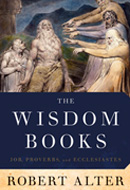October 8, 2010
Englishing the Hebrew Bible
By David Curzon

In the 1980s, the American literary critic and scholar Robert Alter began publishing original studies of the Hebrew Bible that yielded, among other books, The Art of Biblical Narrative and The Art of Biblical Poetry. In 1987 he co-edited, with the late Frank Kermode, The Literary Guide to the Bible, a volume of essays by diverse authors on the books of the Hebrew Bible and the New Testament. Since then he has been publishing his own translations into contemporary English of, to borrow his titles, The Five Books of Moses, The David Story, and The Book of Psalms. The newest addition to this ongoing project, just published, is The Wisdom Books, consisting of Job, Proverbs, and Ecclesiastes. All of these translations, informed by both scholarly understanding and literary sensitivity, are accompanied by detailed commentaries free of jargon. Anyone interested in the Hebrew Bible should become familiar with Alter's undertaking.
In the introduction to his latest volume, Alter helpfully explains the phrase, "wisdom books." As he writes, Job, Proverbs, and Ecclesiastes, while sharing "with Greek philosophy an inquiry into values and a disposition to reflect on the human condition," also form part of a broader corpus of Near Eastern "wisdom literature" characterized by a distinctly pragmatic, didactic, and sometimes skeptical bent. Within that broad category, the "God-obsessed" figure of Job stands out as one who "never wonders or speculates about God's existence." This aside, however, the three wisdom books remain, "in different ways, worlds apart from Genesis, Deuteronomy, and the Prophets."
see
Comments